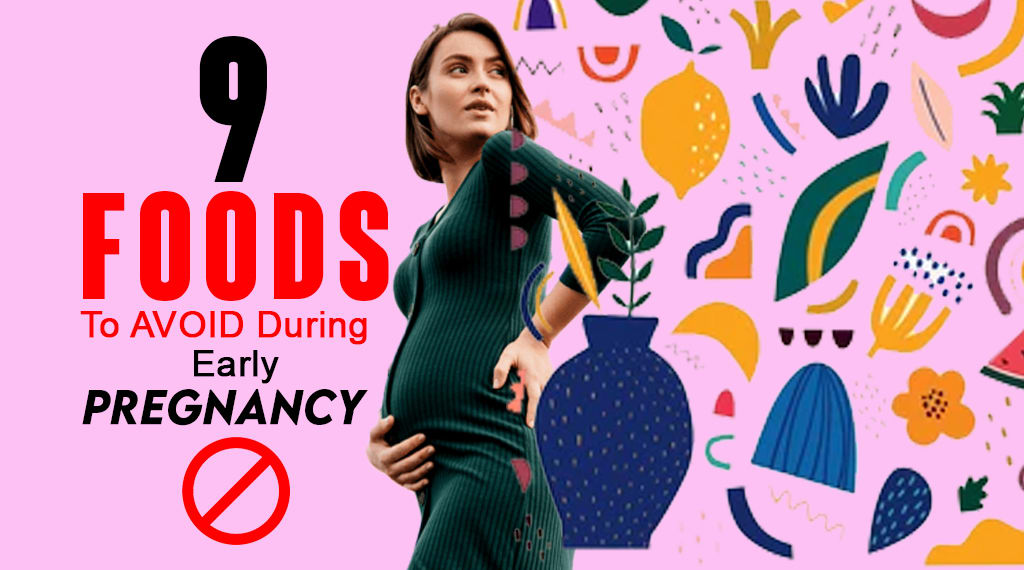9 Foods To Avoid During Early Pregnancy
"Discovering Safe Dietary Choices for Early Pregnancy"

Did you know that some of your favorite foods, the ones you regularly enjoy, could potentially pose risks during the early stages of pregnancy?
In this informative video, we delve into the top nine foods that are recommended to be avoided during early pregnancy. Exploring the reasons behind their potential harm, we aim to provide expectant mothers with valuable insights for a healthy start to their pregnancy journey.
1. Mindful Consumption of Caffeine
Research suggests that surpassing a daily caffeine intake of 200mg – roughly equivalent to one 12-ounce cup of coffee – during early pregnancy could elevate the likelihood of miscarriage by up to 70%. Caffeine's vasoconstrictive effect on placental blood vessels may hinder the optimal flow of oxygen and nutrients to the developing fetus. This inhibition may lead to compromised fetal growth and development, thereby increasing the vulnerability to miscarriage and related complications. Moreover, excessive caffeine intake has been linked to the risk of low birth weight and potential cognitive challenges in children. A prudent approach involves limiting daily caffeine intake to below 200mg.
2. Exercise Caution with Shellfish
Shellfish, encompassing clams, mussels, oysters, crabs, and lobster, may harbor elevated levels of bacteria, viruses, and parasites. This microbial presence could instigate food poisoning, a risk heightened for expectant mothers due to heightened vulnerability. Listeriosis, a bacterial infection resulting from Listeria monocytogenes, is of particular concern as it can precipitate severe consequences such as miscarriage, stillbirth, and other grave health complications.
3. Considered Approach to Processed Meats
The World Health Organization (WHO) classifies processed meats – including bacon, sausages, and hot dogs – as Group 1 carcinogens, capable of causing cancer. Research indicates that substantial consumption of processed meats during pregnancy could amplify the risk of colorectal cancer for both the mother and potentially affect the child's susceptibility to cancer in adulthood.
5. Zero Tolerance for Alcohol
Consumption of alcohol during pregnancy is associated with a spectrum of congenital disabilities and developmental disorders known as fetal alcohol spectrum disorders (FASDs). The absence of a known safe quantity of alcohol during pregnancy underscores the importance of abstaining from it entirely. Fetal alcohol syndrome (FAS), the most severe manifestation of FASD, carries lifelong implications, including cognitive, behavioral, and physical abnormalities.
6. Safe Handling of Meats
Raw or undercooked meats have the potential to induce foodborne illnesses such as salmonella and listeria, which can be especially perilous during pregnancy. Listeria, in particular, can trigger severe health repercussions, including miscarriage, stillbirth, and premature delivery.
7. Opting for Pasteurized Dairy
Unpasteurized dairy products, notably raw milk and certain cheeses, should be approached cautiously due to the potential presence of harmful bacteria. The risks posed by Listeria, Salmonella, and E. coli necessitate a preference for pasteurized alternatives, which undergo heat treatment to neutralize harmful microorganisms.
8. Balancing Spicy Food Consumption
While indulging in spicy foods can offer a delightful gustatory experience, pregnant women should be mindful of potential discomfort. Spicy foods might exacerbate heartburn, acid reflux, and indigestion, common challenges during pregnancy.
9. Thoughtful Consumption of Certain Fruits
Fruits like papaya and pineapple, although rich in nutrients, contain compounds – papain and bromelain, respectively – that can potentially trigger contractions in the uterus. Although scientific evidence is limited, prudence suggests minimizing consumption during the early stages of pregnancy.
10. Considering Fresh Over Canned Foods
Certain canned foods contain Bisphenol A (BPA), a chemical that may leach into food. Higher BPA exposure has been associated with increased risks of behavioral issues and miscarriages. Opting for fresh alternatives is recommended to minimize exposure.
In closing, making informed dietary choices during early pregnancy is pivotal. Consulting a healthcare provider before modifying your diet during pregnancy is always advisable. If you found this article helpful, remember to comment and share for more insightful content. Your thoughts and comments are highly valued – feel free to share your feedback below. Thank you for reading, and we look forward to welcoming you to our next informative session!
About the Creator
Malachi Sopulu
Malachi is a niche expert article creator specializing in sustainable living and eco-friendly practices. His articles not only inform readers about the importance of sustainable choices but also provide practical tips for implementing...






Comments
There are no comments for this story
Be the first to respond and start the conversation.